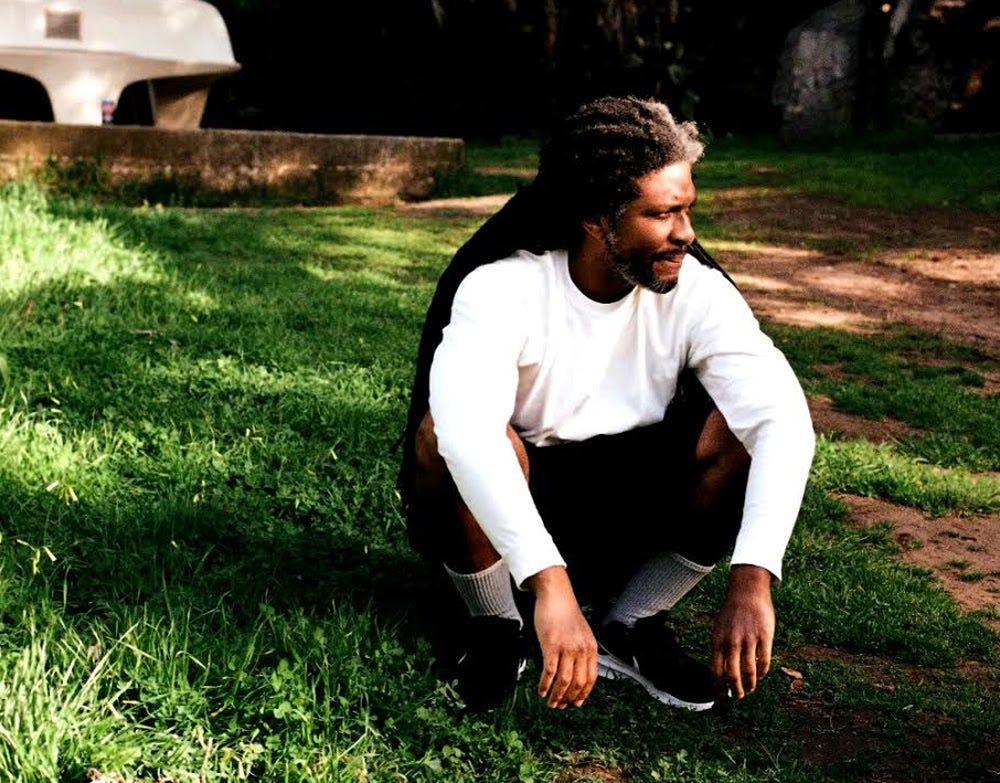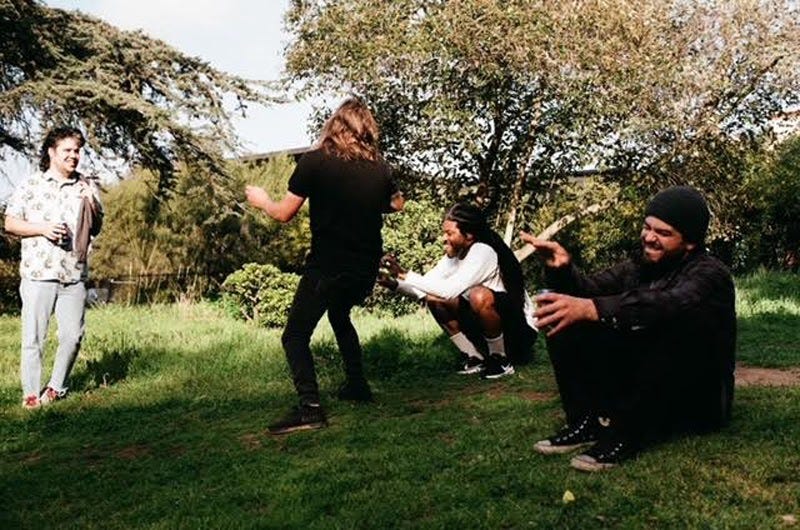10-19 & the Number Men lean into the weird
San Diego rappers explore darkness, fear, and anxiety with one of this year’s most complex (and catchy) records
I’m convinced that the best type of art is at war with itself—an internal argument that pushes and pulls the viewer/reader/listener. Call it tension or anxiety, but it’s a quality absent in most pop-culture. Creators these days work very hard to streamline, smooth out and force lineation. Think of the Marvel movies—studios have pretty much boiled the stories down to a template. And Netflix shows are now developed by algorithms.
While there’s nothing wrong with enjoying mass-produced art, it never allows itself to get too weird. If opposing forces like emotion, tones, messages or themes exist within the same work of art, it’s both the artist’s and consumer’s inclination to resolve them.
But some art lets the tension ride. It contains multitudes, letting that disharmony just vibe, with no attempt at a solution. This type of art strongly appeals to people who consume an unhealthy amount of music, books, movies, etc. Because, eventually, the monoculture gets boring. We need something distinct, something unsettling, something weird to shake us.
And this is how I justify to rapper 10-19—the moniker of J. Smith—why I think his music is “weird,” and also why I insist that it’s a compliment.
“I fought against that for the longest time,” Smith says, laughing. “I was like...‘weird’? I didn't know how to take it.”
This, obviously, is not the first time someone’s described Smith’s music that way. For more than a decade, Smith has been twisting up San Diego’s rap scene with his distinct flow and experimental production. From 2007 to 2013, Smith played the darker half of Parker and the Numberman before going solo as 10-19 the Numberman. It was during this incarnation that Smith put out the fantastic and surreal 2017 mixtape, Solus Superstes, which my former CityBeat colleague Jeff Terich declared “wonderfully weird” in our annual Great Demo Review—a feature that required CityBeat staff to listen to and review every demo, album, or song sent to us. It was a brutal, monotonous endeavor (you may have an estimate as to how many bedroom chillwave artists live in your city, but I assure you: it’s more). So when something unsettling, unique or weird came across our desks—something like 10-19—we woke the fuck up.
“I don't think I'm a weird dude or anything like that. I don't even think I make particularly weird music,” Smith says. “As time has gone on, man—now I think it's a compliment. And I think it's a really authentic compliment. It's taken me a very long time to get there. I'm really starting to embrace it.”
But the use of “weird” here is not to imply that 10-19’s music is elusive or esoteric. In fact, it’s super accessible. It also moves. But those who pay attention will pick up on the underlying tension and anxiety that runs beneath the music’s sunny exterior.
And that intriguing dichotomy is perhaps best displayed in Smith’s latest project: 10-19 & the Number Men.
As the collective name implies, the new group features Smith backed by live musicians: Sean Burdeaux on bass and keyboard (Burdeaux also runs San Diego record label It’s Okay I’m Crying), Joel Kynan on keyboards and Brian Scafidi on drums.
Last January, the band released the EP Spokes—a six-track banger that feels custom made for a hot San Diego afternoon with a few beers and a little bit of weed at your disposal. These songs push the boundaries of what hip hop can do by mixing trip-hop, vintage boom-bap and a little bit of trap. But there are other left-field elements that keep listeners on their toes, including hints of neo soul, smooth jazz, and lounge. To hear 10-19’s distinct and masterfully anxious delivery laid atop such rich and laidback music makes for one of the most compelling records this year.
“I knew Sean [Bordeaux].” Smith says, describing the formation of the band. “He'd send me beats and I just start writing to them. Then I had a show at Winston’s [in Ocean Beach], and I was like ‘Hey, man, you want to play the show?’ He's like, ‘Okay, I'll do it. But let me ask these guys if they want to do it live.’ And I was like, yeah, whatever. So we get together and we start jamming, and probably about after, like, 15 minutes. I was like, ‘Oh, these dudes are bad! These dudes are dope.’
“Like, they're white dudes,” Smith continues, laughing. “I mean, I kind of slept on them. What do these dudes know about beats and rap and shit, you know what I'm saying? And they started playing. I was like, ‘Oh my God. They know a lot.’ They're just incredibly talented cats, man. Those dudes are just so fucking amazing.”
Unfortunately, the successful Winston’s show happened in February 2020, which—perhaps you may remember—is the month the whole world began to shut down. For the rest of that year, the group recorded Spokes remotely, sending beats and lyrics back and forth via email. It proved to be a welcome distraction from the turmoil that was setting in.
“It just gave us something to do,” Smith says. “Early on in the lockdown, like March and April, I remember just bugging out some days, waking up and being like, ‘Yo, man, what the fuck is going on?’ Just all that fucking anxiety and dread—it led to this project. I was anxious and nervous, and I was like, ‘You know what, I'm gonna just make some anxious and nervous shit.’”
While COVID doesn’t play an explicit role in Spokes, the fear and uncertainty it brought along with it creeps around the edges of the record, especially on “July 10th,” which begins with the lyrics: “Six feet, stay away from danger/How it happened, well, nobody knows/This week, all I felt was anger/Stay away, don't you dare come close.”
Or take “Acetone” a bouncy track that feels like the perfect soundtrack to cruising the 101 in a convertible, yet features Smith wearily repeating the line, “Trust no one.” It’s another example of 10-19’s talent for delivering a chilling message in a bright package.
“There were points last year when I was just scared,” Smith says. “I was at a grocery store, and this lady, she was pretty nervous about the sun going down and what the night was going to bring, you know? It just—it shook me. I looked around and remember thinking, ‘Everything's going to shit.’ Not one thing, not two things, but everything. Then I was like, ‘You know, man, let me just walk into this. Let me rap about being scared.’”
Turns out, recording Spokes was not only a distraction from a world on fire, but it proved to be a cathartic experience—a project through which Smith could channel some heavy emotions.
“I recorded everything sitting down. I was trying to sound tired, worn out,” Smith says. “I was trying to get to a certain place emotionally. Doing that, I was able to let a lot of that [fear] go.”
And that’s part of what’s so “wonderfully weird” about 10-19’s music—it’s unafraid to let its disharmonies coexist alongside each other: sunny and sad. Smooth and abrasive. Complex and accessible. It’s art like this that’s ultimately the most cathartic, as evidenced by Smith’s astute summation of the recording process.
“I was almost energized after I finished...It definitely felt good to just kind of be sad.”
Go buy Spokes on Bandcamp.
THE WEEKLY GOODS
Subscribe to this
As I’ve mentioned before, risograph zine publisher Burn All Books lost their physical storefront during the pandemic, which is a huge bummer since they were the city’s number one source for transgressive, funny, political and beautiful publications. And while they’re still raising money to afford a new location with fellow art pioneers Teros Gallery (please help them get a new home—they’re over halfway there!), you should subscribe to BAB’s monthly newsletter. Every month, I look forward to what I refer to as BAB mail day—sometimes the newsletter is a zine, sometimes it’s a call-to-action, sometimes it’s poetry—but it’s always a treat. And here’s another incentive: The folks at BAB HQ are allowing me to write/design June’s newsletter. Hell yeah. It’s an honor that I’m taking very seriously, and I’m excited to show it to you. Go sign up for a BAB membership to get your newsletter.
Read this
For the most part, I’ve given up on trying to follow the world of craft beer. That’s not to say I don’t enjoy a sweet hazy with my bros every now and then, but I’d be equally happy to shotgun a Miller Lite. However, I’ll still read pretty much anything written by my friend, former CityBeat colleague and beer expert, Beth Demmon (who also writes a newsletter). A few days ago, she published an article about the rampant sexism, assault, and harassment that permeates the craft beer scene. Personally, I was pretty shocked to hear about Modern Times, which seemed like this bastion of progressive equity. I hope they take the moment to reflect, put in the work, and change for the better.
Mourn this
I was very bummed to hear about actor/comedian Charles Grodin’s death. Beethoven was one of the few VHS tapes my family had when I was growing up, and I still picture the scene of him being slimed with Beethoven’s drool every time I meet a Saint Bernard. The guy pretty much perfected the art of being cantankerous, and his long-running bit of being antagonistic toward late night talk show hosts is legendary. You can pretty much just google “Charles Grodin interview” and find gold, but this interview he did with Johnny Carson is master class.
Also, my friend reminded me of this scene from Clifford which is the funniest scene in cinematic history.
Got a tip or wanna say hi? Email me at ryancraigbradford@gmail.com, or follow me on Twitter @theryanbradford. And if you like what you’ve just read, please hit that little heart icon at the end of the post.
Julia Dixon Evans edited this post. Thanks, Julia. Go follow her on Twitter.




